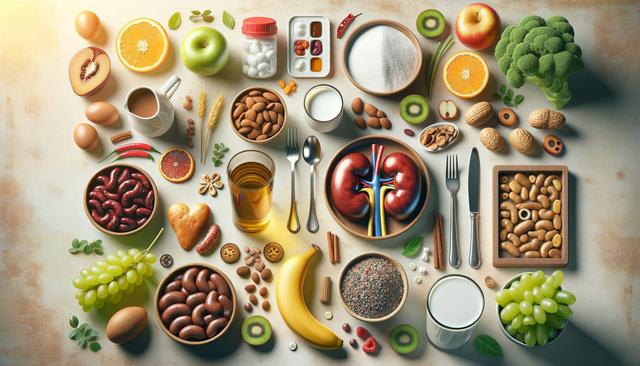Understanding Kidney Function and Dietary Impact
The kidneys are vital organs responsible for filtering waste, balancing fluids, and regulating essential minerals in the blood. When kidney function declines, these tasks become compromised, leading to the buildup of harmful substances in the body. For individuals with kidney disease, dietary choices can significantly influence how well the kidneys function and how symptoms are managed. A well-structured eating plan can help reduce the strain on kidneys, slow the progression of the disease, and improve quality of life.
One of the main concerns in kidney disease is the body’s reduced ability to eliminate excess nutrients and waste. Therefore, it’s essential to focus on foods that are easier on the kidneys. This often means limiting certain nutrients like sodium, potassium, and phosphorus. At the same time, ensuring adequate protein intake — without consuming too much — becomes a delicate balancing act that needs to be personalized based on the stage of kidney disease.
Foods to Include in a Kidney-Friendly Diet
People with kidney disease can benefit from incorporating specific foods that support kidney health and minimize additional strain. These foods are typically lower in certain minerals and easier for the kidneys to process. Some suitable options include:
- Fresh fruits such as apples, grapes, and berries (in controlled portions)
- Vegetables like cabbage, cauliflower, and green beans
- Whole grains with lower phosphorus content such as white rice or refined pasta (in moderation)
- Egg whites as a high-quality protein source with less phosphorus
- Unsalted snacks and homemade meals to control sodium intake
Hydration is also important, though fluid intake may need to be monitored depending on the stage of the disease and individual fluid retention. It’s advisable to consult with a healthcare provider or dietitian who can tailor recommendations to personal needs and lab results.
Foods to Limit or Avoid with Kidney Disease
While some foods are beneficial, others can aggravate symptoms or accelerate kidney damage. Avoiding these items can help maintain better control over mineral and waste accumulation in the body. Common foods to limit or exclude include:
- Processed meats like sausages and deli slices, which are high in sodium and phosphorus
- High-potassium fruits and vegetables such as bananas, oranges, tomatoes, and potatoes
- Dark-colored sodas, which often contain added phosphates
- Dairy products, which are rich in phosphorus and potassium
- Fast food and prepackaged meals, due to high sodium content
Reading nutrition labels is a practical habit that can help identify hidden sources of sodium, phosphorus, and potassium. It’s also wise to avoid salt substitutes unless approved by a healthcare provider, as many contain potassium chloride.
Managing Protein Intake Wisely
Protein is essential for maintaining muscle mass and supporting various bodily functions, but in kidney disease, an excessive intake can overwork the kidneys. The amount of protein a person needs depends on several factors, including the stage of kidney disease, body size, and whether the individual is undergoing dialysis.
For those in early stages of kidney disease, a moderate protein intake may be recommended to reduce the workload on the kidneys. In contrast, individuals on dialysis often require higher protein intake to compensate for losses during treatment. Suitable protein sources include:
- Egg whites
- Fish (in limited amounts and preferably low-sodium varieties)
- Skinless poultry
- Plant-based proteins like tofu or lentils (monitored for potassium and phosphorus)
Balancing protein intake is best done under the guidance of a registered dietitian who can ensure nutritional needs are met without compromising kidney function.
Working with a Kidney-Specialized Dietitian
Managing kidney disease through diet can be complex, as nutritional needs vary depending on the stage of the disease, other health conditions, and lab results. A dietitian who specializes in kidney health can provide invaluable support by creating a customized eating plan that meets individual dietary requirements while addressing restrictions.
Many people with kidney disease benefit from regular consultations with a dietitian to:
- Adjust their diet as kidney function changes
- Understand how to balance nutrients like sodium, potassium, and protein
- Receive meal planning tips and food preparation strategies
- Address challenges such as lack of appetite or dietary boredom
Involving a knowledgeable healthcare team, including a nephrologist and a renal dietitian, can lead to better disease management and improved outcomes over time.
Conclusion: Making Informed Food Choices for Kidney Health
Living with kidney disease requires making smart, informed decisions about food. By understanding what to eat and what to avoid, individuals can help protect their kidneys and maintain a better quality of life. While dietary changes might seem overwhelming at first, working with a healthcare professional and gradually adapting habits can make the transition smoother and more sustainable. With the right support and knowledge, nutrition can become a powerful tool in managing kidney disease effectively.




Leave a Reply